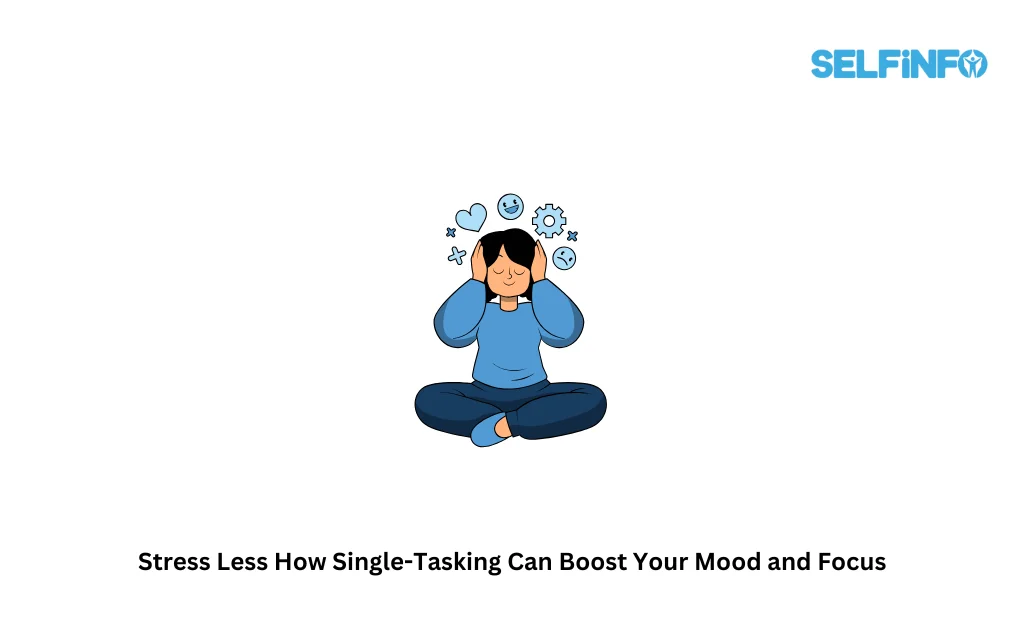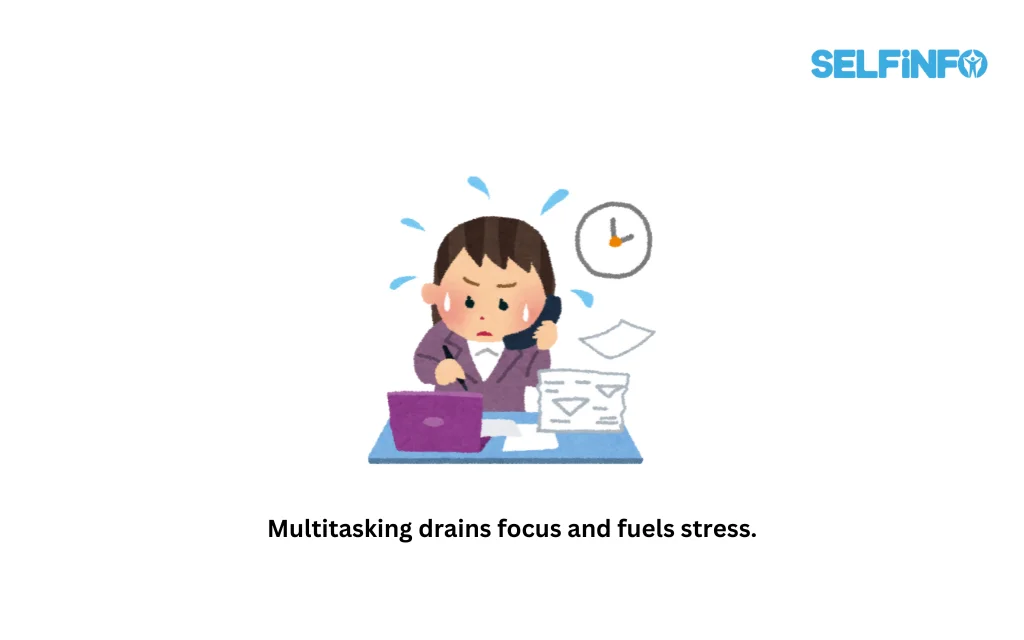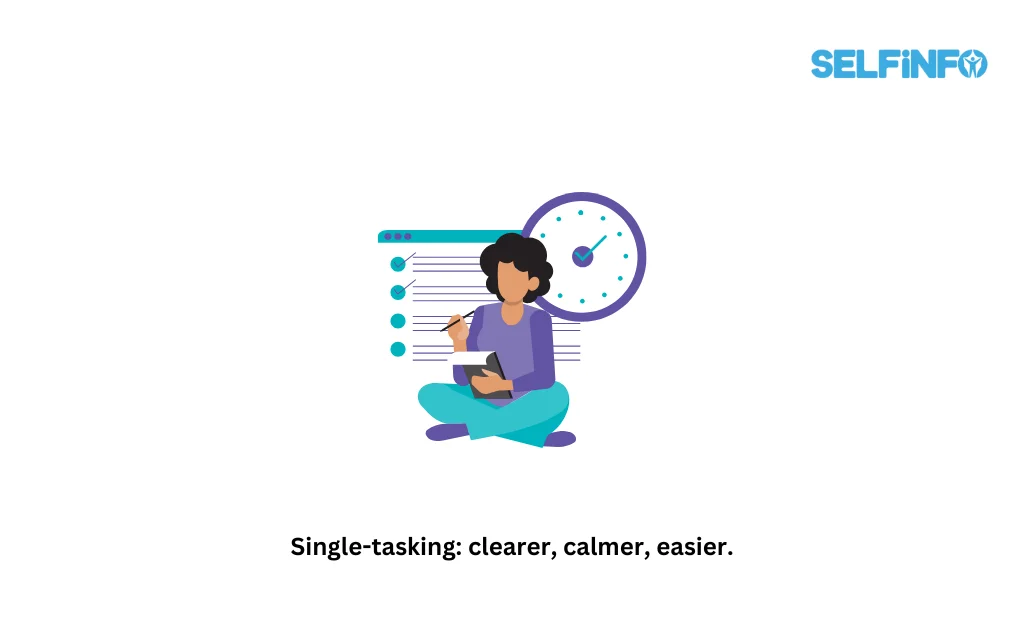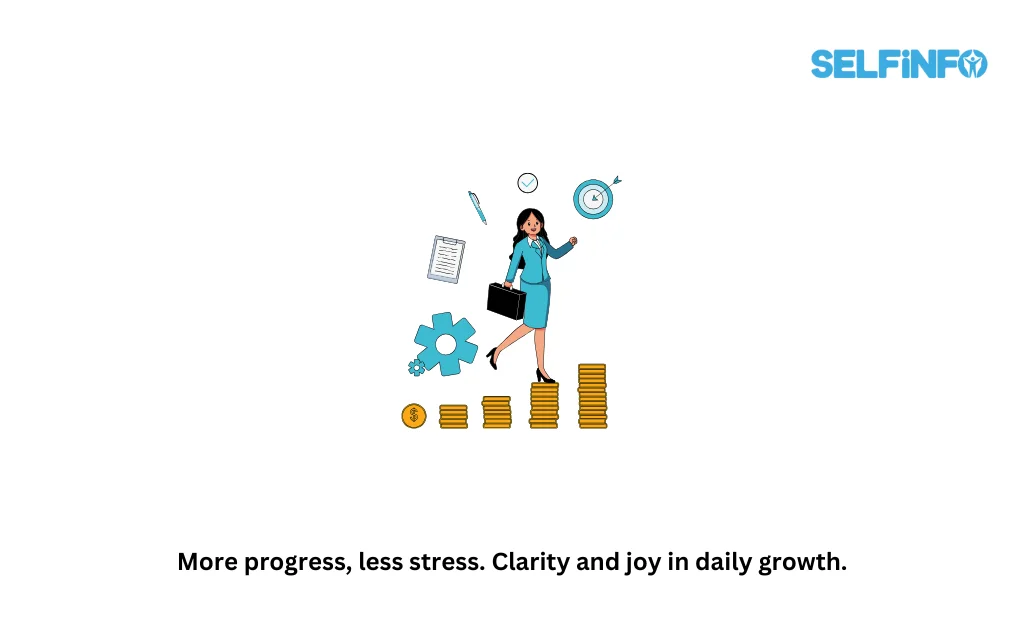Stress Less knowing that my multitasking habits are in recovery. While multitasking once meant watching TV while knitting, gaming, or scrolling through social media, I often juggled them all. Now, I’m learning to slow down and focus on one thing at a time.
Doing a load of laundry, including folding and putting it in the dryer, might be considered “writing a blog article.” Research, social networking, preparing a meal or snack, checking email, texting my children, and other activities may also be included.
I used to take great pride in my ability to multitask and get through each day. I would run several errands and make phone calls to make appointments, which required me to check my phone’s calendar as well. I would make a grocery list, cook dinner, listen to the evening news, and browse social media.
“I am quite productive,” I would assume. “Take a look at everything I am doing.”
The garments sat overnight and began to smell weird since I forgot to move them from the washer to the dryer. Or I might overlook a crucial component of a phone call or task. Or the onions I was supposed to be browning might burn because I was preoccupied with something on my phone.
It is more challenging to ask your conscious mind to perform several tasks simultaneously. The human brain is not capable of handling so many tasks at once. It performs well in functions governed by the autonomic nervous system, such as maintaining blood flow and breathing.

Basically, when you multitask, your brain quickly switches between two or more tasks. The likelihood that anything will be dropped or lost as your brain tries to shift focus increases with the number of simultaneous tasks you attempt.
It is not unusual to discover that you missed tomorrow’s weather because you were reading and not listening, or that you need to go back and read some or all of the email again because you were listening and not reading, if you have ever tried something like listening to the weather forecast for tomorrow while reading an email.
Things become more complicated when attempting to absorb two separate kinds of information, such as a face-to-face conversation while watching a television program. Perhaps you lose sight of the show and what is happening, or you lose sight of the story being told by the person in the room next to you. Perhaps a little bit of both.
The same is true for changing tasks at work, a topic covered in countless papers. It is not unusual to be working on a note or email when you become distracted by other emails or texts, phone calls, or individuals dropping by your desk. You have to shift your attention after each interruption and then go back to writing.
Every time you shift your attention, whether it is because of multitasking or an interruption, it takes your brain some time to refocus and get back on track. While it frequently takes minutes, it can occasionally take seconds. You spend more time getting back on track the more times you switch tasks, even if just briefly.
A Forbes article claims that multitasking can lower your productivity by up to 40%. In terms of output levels or time, it is inefficient.
However, that is not the true threat. Your mental and cognitive processes will suffer if you multitask. Stress, impatience, and irritation may rise as a result.

According to studies, media multitasking—that is, navigating between social media platforms or scrolling through them while viewing something else on a different screen—can cause social anxiety and even depression.
We get more distracted and disrupt our mental processes the more we “multitask,” or alternate between things. We may experience anxiety as a result of worrying that time is passing us by.
I started attempting to multitask as much as I could in November 2021 because of an ongoing global pandemic and an unexpected wave of exhaustion at home brought on by my autoimmune conditions.
After reading numerous articles about multitasking and brain health, I reasoned that perhaps it would be better if I did not put as much strain on my brain. I reasoned that concentrating on one thing at a time could feel like self-kindness because I typically start off with hazy or confused thoughts due to exhaustion. It produced some intriguing findings.
Single-tasking was gentler to me, and I was correct. It was simpler to concentrate and finish the activity if I just expected myself to perform one thing at a time. I used single-tasking for both work and housework, as well as for relaxation.

I discovered that I could focus more intently on whatever I was doing while I was single-tasking. If I was writing a blog article, I could write it faster if I just wrote it instead of leaping to make graphics for it, coming back to write more, going to another website to study it, then coming back to write more, etc.
Additionally, by single-tasking, I was able to divide difficult activities into smaller, easier-to-manage chunks, each of which was given a specific amount of time. I would therefore generate a concept and then investigate it. After writing the blog article, I went to make the necessary visuals. And so forth.
On the one hand, I was completing all of the typical chores required to write a blog post, but I completed each activity individually rather than bouncing between them to multitask. I was surprised to discover that by separating those components and then focusing on just one activity at a time, I was able to save up to an hour of my time.
Furthermore, I discovered that I had a feeling of accomplishment when I was able to finish my work when I concentrated on one task at a time. I felt more successful. It was also lot simpler to see where I needed to pick things up if I had to take a break.
Not only did I feel more productive, but I also had less stress overall. I was able to rejoice in my daily development. I began to gain a clearer understanding of what I could actually achieve.

It felt so much simpler, especially after I realized that single-tasking would allow me to complete as many chores as multitasking, if not more, in a single day. I reduced the number of times I distracted myself with other things by concentrating on one task at a time. I discovered that I frequently completed projects earlier, which allowed me extra time for leisure and breaks.
I now make a concerted effort to switch to single-tasking whenever I can. to concentrate on one task at a time or perform one item at a time as opposed to attempting to do several things at once.
That is simpler to do on some days than others. However, I consistently observe that my stress levels drop when I achieve success. My ability to concentrate and complete tasks improves.
Furthermore, my productivity actually rises in tandem with the studies.
The following advice will help you give it a try:
- Turn off your phone when attempting to use a computer.
- If necessary, use a social media blocker program like Freedom. It lets you control how much time you spend using it and keeps you from “just checking one thing” and falling into a rabbit hole.
- Make a daily to-do list for yourself that includes no more than three top priorities. Take them one at a time, in order. After they are finished, you can either relax your boundaries or go on to something else.
- To concentrate on a task, set a timer. When the timer goes off, give yourself permission to take a break or even to finish the task for the day.
- Set a challenge for yourself to put your laptop and phone aside while you watch a movie or TV show so that you can concentrate solely on what you are watching.
- Create a system of rewards for yourself to promote the practice of single-tasking.
- If you “catch” yourself multitasking, do not lose your cool or give up. That habit took you a long time to form, and it will take you some time to break it.
I am a recovering multi-tasker, therefore I do not yet have this down pat, as I mentioned at the beginning of this essay. I will be over here honing my ability to concentrate on one thing at a time if you need me.
